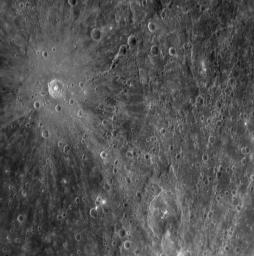
|
Mercury’s Cratered Surface
- Click the image above for a larger view
- Full-Res JPEG (1016 x 1024) (171.9 kB)
- Full-Res TIFF (1016 x 1024) (1.0 MB)
Caption:
During its flyby of Mercury, the MESSENGER spacecraft acquired high-resolution images of the planet's surface. This image, taken by the Narrow Angle Camera (NAC) on the Mercury Dual Imaging System (MDIS), was obtained on January 14, 2008, about 37 minutes after MESSENGER's closest approach to the planet. The image reveals the surface of Mercury at a resolution of about 360 meters/pixel (about 1180 feet/pixel), and the width of the image is about 370 kilometers (about 230 miles). This image is the 98th in a set of 99 images that were taken in a pattern of 9 rows and 11 columns to enable the creation of a large, high-resolution mosaic of the northeast quarter of the region not seen by Mariner 10. During the encounter with Mercury, the MDIS instrument acquired image sets for seven large mosaics with the NAC.
This image shows a crater with distinctive bright rays of ejected material extending radially outward from the crater's center. A chain of craters nearby is also visible. Studying impact craters provides insight into the history and composition of Mercury as well as dynamical processes that occurred throughout our Solar System. The MESSENGER Science Team has begun analyzing these high-resolution images to unravel these fundamental questions.
Mission Elapsed Time (MET) of image: 108827082
Background Info:
These images are from MESSENGER, a NASA Discovery mission to conduct the first orbital study of the innermost planet, Mercury. For information regarding the use of images, see the MESSENGER image use policy .
Cataloging Keywords:
| Name | Value | Additional Values |
|---|---|---|
| Target | Mercury | |
| System | ||
| Target Type | Planet | |
| Mission | MESSENGER | Mariner |
| Instrument Host | MESSENGER | Mariner 10 |
| Host Type | Orbiter | Flyby Spacecraft |
| Instrument | Mercury Dual Imaging System (MDIS) | |
| Detector | Narrow Angle Camera (NAC) | |
| Extra Keywords | Crater, Grayscale, Impact | |
| Acquisition Date | ||
| Release Date | 2008-01-16 | |
| Date in Caption | 2008-01-14 | |
| Image Credit | NASA/Johns Hopkins University Applied Physics Laboratory/Carnegie Institution of Washington | |
| Source | photojournal.jpl.nasa.gov/catalog/PIA10173 | |
| Identifier | PIA10173 | |
